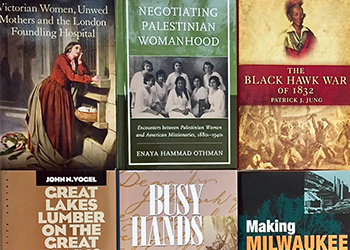W 5:00-7:30 pm
Dr. Timothy G. McMahon
HIST 6961—Master of Arts Essay and Professional Discernment
This graded 3-credit workshop serves a dual purpose. First, it provides structure to complete the required MA essay or public history project (due to the Graduate School no later than 4 p.m. on April 16). All students will present a version of their project as a research poster in early April. Second, it guides professional discernment to explore opportunities for historians inside and outside academe. In addition to shared readings and reflections, we will have guest presenters. The class will meet in conjunction with HIST 8961 Doctoral Discernment.
NB: MA students typically enroll in this class in their final spring semester to accommodate graduation deadlines. Any Incomplete grades (especially from HIST 6954) are expected to be cleared before the start of the semester and each student must submit a plan for revising their essay or project in the first week of classes (guidelines for this plan will be shared in mid-November for students enrolled in the class). This class is required for all students who have updated their Bulletin year to the current catalogue (i.e. elected for the essay-only option in place of essay and MA comprehensive exam). Students under the previous Bulletins who are still completing essays also are welcome to enroll.
HIST 8961—Doctoral Discernment and Field Preparation
This graded 3-credit workshop serves a dual purpose. First, it provides structure to prepare for the Doctoral Qualifying Examinations, which may be taken as early as the end of semester and ideally by the end of the summer (as required by some research fellowships). PhD students should enroll in this class following their dissertation seminar (HIST 8960, typically taken in the fall semester of their second year) which develops the major reading list and starts to frame the research question(s) for the dissertation. 8960 also should identity the two minor fields which address methodological and thematic issues connected to the dissertation research. These fields and their examiners need to be confirmed by the start of the semester: iterative bibliographies for these fields will be due by the end of January. Students will present a poster version of their draft dissertation proposal in early April.
Second, the workshop encourages ongoing career discernment as students prepare to undertake their dissertation research. PhD students will participate in engaged discussions with the MA students in HIST 6961 and guest speakers, as well as prepare a reflection on their goals and strategies for exploring a range of professional opportunities. Each student will be expected to do at least one informational interview during the semester with a historian who is working in a field outside academia.
This course fulfills two of the University’s Career Skills Requirements: Career Discernment and Communication.


